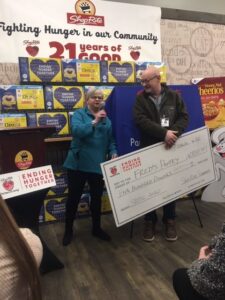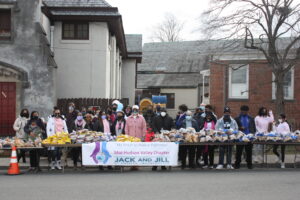
Have you been to the supermarket recently? With inflation driving up the cost of food, gas and shelter, Caring for the Hungry and Homeless of Peekskill, Inc. (CHHOP) has seen an upsurge in people facing food insecurity who rely on its Fred’s Pantry service.
In this exclusive River Journal North Q & A, CHHOP CEO Cynthia B. Knox and CHHOP Operations Manager Jeff Miller address the current situation and explain how we all can help those for whom food insecurity is a devastating fact of life.
Fred’s Hours > Wednesdays 4 p.m.-6 p.m.; Saturdays from 9 a.m.-11 a.m.
To inquire about volunteering > chhop.org/volunteer
What is the origin story of CHHOP?
In 1988, a man who had nowhere to go suffered severe frostbite in Peekskill from living outside that winter. That galvanized people in Peekskill to form a committee, which met weekly in Dr. Janet Foy’s office to brainstorm housing solutions. In addition to their own donations, the committee solicited financial support from others, including Peekskill Area Pastors Association (PAPA), to create a safe place for those without a home. The spirit, passion and compassion of those founders live on in Jan Peek House, a 24-hour, 365-day a year shelter for adult men and women.
Over the years, CHHOP has added programs, including Fred’s Pantry in 2010 in response to the great recession. In 2014, CHHOP started a program to assist VA eligible veterans access housing and healthcare. The Turning Point program was launched to assist with the varied and complex issues faced by people with disabilities. CHHOP partnered with My Sisters’ Place and Lifting Up Westchester in 2019 to create RISE, a program providing holistic services to survivors of domestic violence so that they can rebuild their lives with compassion and dignity.
What services does CHHOP provide?

We provide the basics for a healthy, nutritious diet, which helps people ensure that they have resources that keep their families housed. In addition to Fred’s Pantry, we provide transitional and long-term housing and advocate funding for housing programs and development.
How has the 8% increase in the consumer price index affected the Pantry?
There are two issues: the first is the rising cost of food that zaps our wallet each time we buy groceries. Fred’s is spending 10%-20% more for food this year. Fish, beef, eggs and chicken have risen an average of 12%.
The second issue is the overall cost of living. February 2021 attendance at Fred’s was up 50% year over year. That means we are buying 50% more food than one year ago. Single and family households alike face rising costs in housing and utility bills. Yet, wages have not risen enough to keep us afloat. We are seeing between 25 and 40 new households a week at Fred’s. Some of those clients said they either haven’t been to a Pantry before or this is their first time coming to Fred’s in years.
How can the community contribute to alleviating food insecurity due?
Be aware of what is happening economically in Peekskill. From 2018 to mid-2019, Fred’s served between 75 and 100 households each week.
Once the pandemic hit, we served, on average, 360 households per week with the average number of household members at 4.1. The peak week was in May 2020 when we served 569 households, representing approximately 2,300 people.
Through February 28 of 2022, we’ve served 3,000 households, up 33% year on year.
Another way the community can help is to encourage better nutrition across all segments of society, but not with canned goods. What we do requires a lot of coordination and pre-planning, so cash donations through chhop.org or food drives are greatly appreciated.
In January 2022, for example, Jack & Jill Mid-Hudson Valley held a food drive that collected bags of dried rice and beans and fresh potatoes – and nothing more. Not only were these items healthy choices for our clients, but also lend themselves to easy shelf-life storage and distribution.
What is the most important food item on Fred Pantry’s shopping list?
In contrast to “traditional” food pantries that rely on canned goods, we offer a variety of healthy, nutritious food. Canned goods are often high in sodium or sugar, and are not great for our clients, who need to feel secure that Fred’s provides alternatives to high sodium and sugary foods. We also encourage them to cook and improve diets at home.
There is not just one important food item on our list, but a selection of fresh greens and spices, fresh fruits and vegetables, plus dried goods such as rice and beans and meat, fish and/or chicken.







People of Peekskill should not support CHHOP. Staff take most donated food, clothing, etc. And will force away disabled homeless on Social Security to make way for staff’s friends.
Administration does poor oversight.
Where’s the CEO of this place?
Who’s finding this overstaffed joke of an operation?